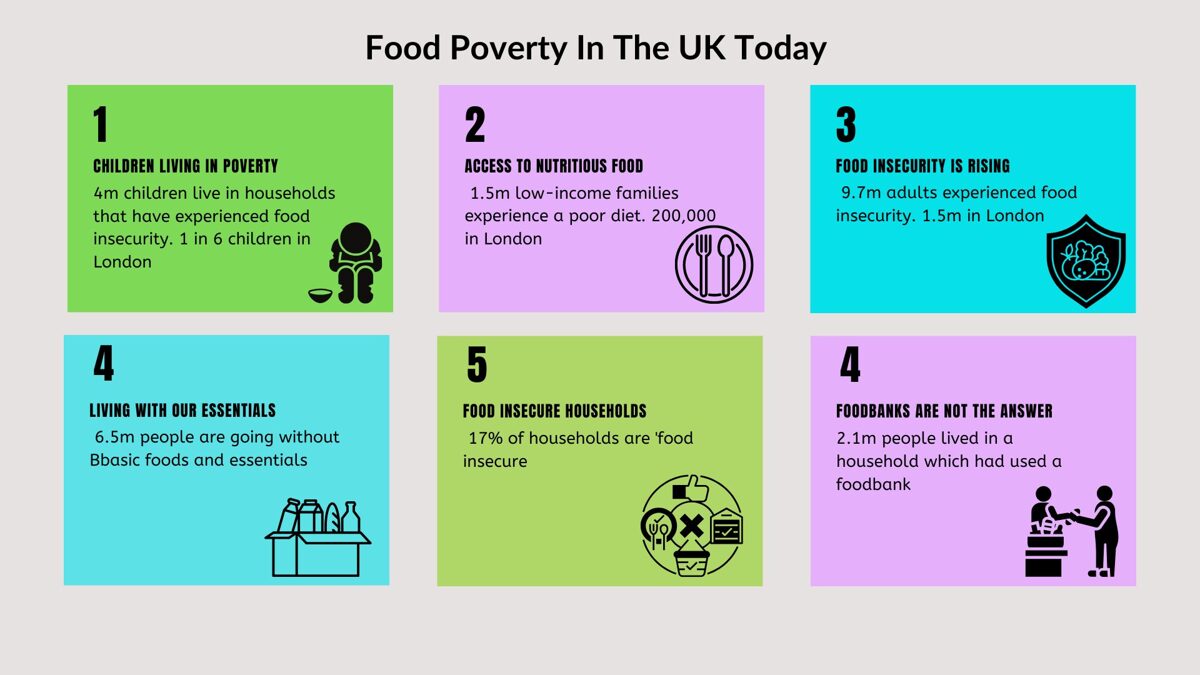Why I could never take calls from clients.
I was chatting to the CEO the other day who rang up to discuss an event she was hosting in the UK, the client is not British and comes from a wealthy family and runs a sizable business. She wanted to know more about the impact we make and why did I chose food poverty as our purpose. I have never been asked that by a client I must admit, So I explained that food poverty can severely affect low-income families with limited resources to plan and prepare healthy meals for themselves and their children and some have difficulty in affording fresh ingredients to cook wholesome meals at home.
Food poverty is not just an African problem
Her response was she just assumed food poverty and starvation is a thing of the past and affected the African nations. She seemed a bit bemused when told her over 9m adults and 4m children are food insecure. With 1.5 m of those live in London and that one of the reasons we moved to a purpose-driven model as we wanted to be part of the solution.
Why are so many people living on the bread line?.
It’s because many have a lack of income or are badly paid rather than food is scarce and it's the main driver of hunger, food poverty and food-related health inequalities in England. While food inflation did level off, but it’s on the rise again and food while food prices remain high and people across the country will continue to struggle to afford essentials.
The is no short answer to that question it’s a complex issue and it starts with food waste; we have become a convenience and throw-away society and I think people and the government do not care as much these days.
What about waste is that not part of the problem?
Yes, but there is no short answer to that question it’s a complex issue, say that we have become a convenience and throw-away society and I think people and the government do not care as much these days while corporations are focused on profits and shareholders.
We have huge amounts of food waste from hospitality businesses, supermarkets could play a much bigger role in cutting food waste. But this would lead to some uncomfortable questioning of their practices. Food manufacturers and some we don’t see or know much about is the waste created by the likes of @deliveroo and @just eat. Why is that? they tell the restaurant when to cook the food and when the drivers are late, it's cold and fast-food companies have to throw it away as its breaches their holding times policy. Wow, I never thought of it like that and never ordered from them. they have their family chefs,

But what would you do to end poverty?
My response is the same as I always say “we need collective responsibility and a much bigger effort from everyone in the food industry. I believe we have a shared responsibility, and I think that if you want to start or are operating a food company, you should be mandated to make a scaled contribution of up to 1% of revenue to ending food insecurity, poverty and waste. This creates a system where fighting hunger and waste becomes a core part of doing business in the food industry and would have a huge impact and benefits”.
It would create a massive and sustainable fund and an ever increasing one at that, this could be dedicated to addressing food poverty. As the food industry grows, so would the contributions, ensuring a sustainable flow of resources.
Universal participation: Requiring every food company to contribute creates a sense of shared responsibility across the industry, from small local businesses to multinational corporations. It has to a fair an equal contribution so by deploying a sliding scale from pop up to grown up.
The pool of funding could be used to provide growth funding to those that are mission driven or the many SME’S and CIC’s that want to or who are making a bigger impact in society. This would help them to expand their operations and innovate as they are often less attractive to lenders and VC’s.
With a steady stream of funding, the focus could shift from solely addressing immediate needs to investing in long-term solutions and preventative measures in sustainable agriculture, economic development, and education and empowerment.
There comes a time when one should just stop speaking
In a bit of a raised voice is said” to make this work, we need to change the influence of shareholders over corporate decision-making, many PLCs shareholders them to deliver the maximum shareholder value and this often takes precedence over other considerations. Because let’s be honest doing the right thing in most PLC’s means doing the right thing for their shareholders and no one else. There would need to be a shift in focus from solely maximising shareholder value to a more holistic approach that considers the interests others, from employees and consumers to communities and the planet. She said perfect, you will be the perfect caterer and guest.
sorry what’s the event ?? “it’s a round table dinner for 30 CEO’S and something along the lines how the world has become so wasteful, I zoned out as a sudden wave of nausea hit me
